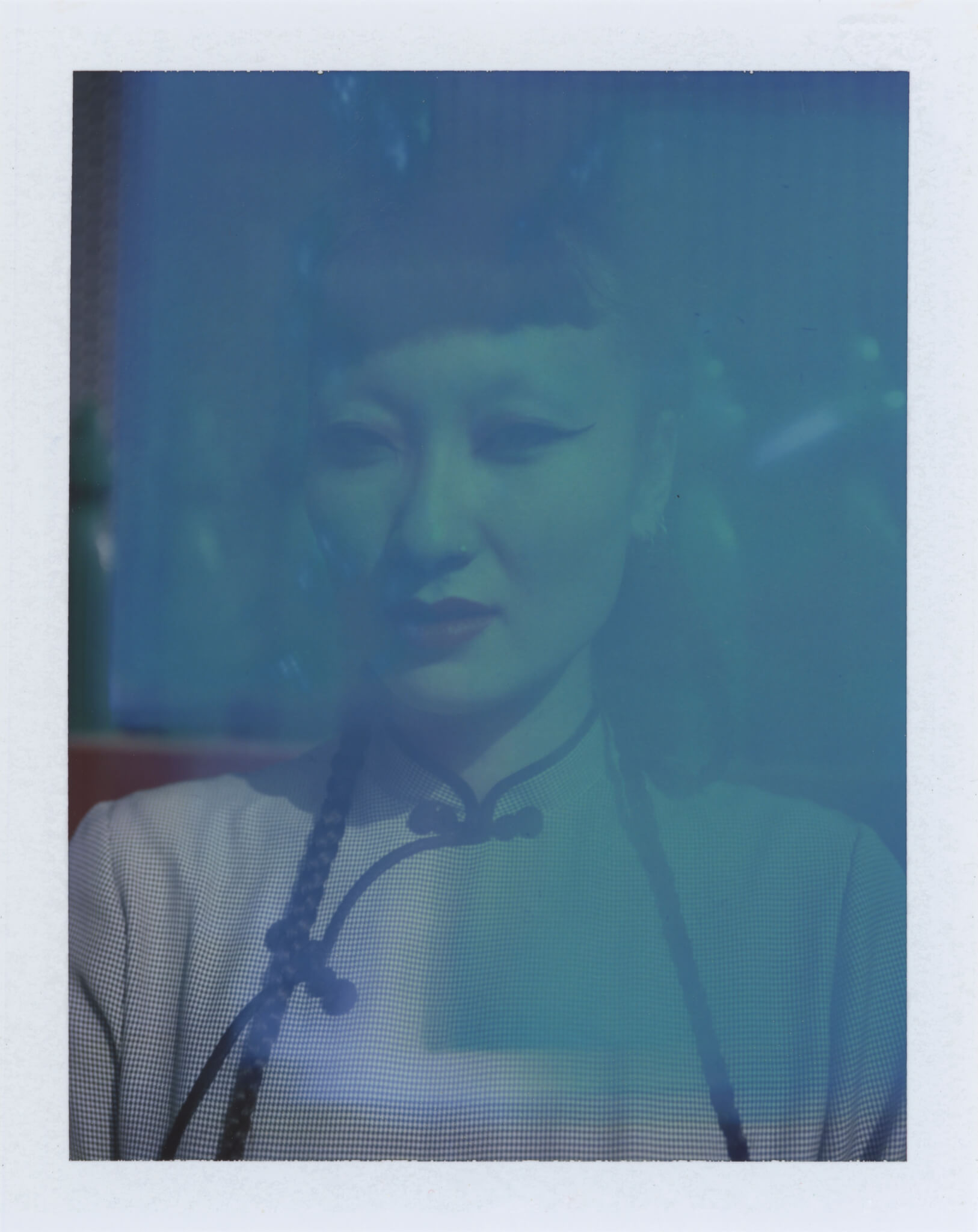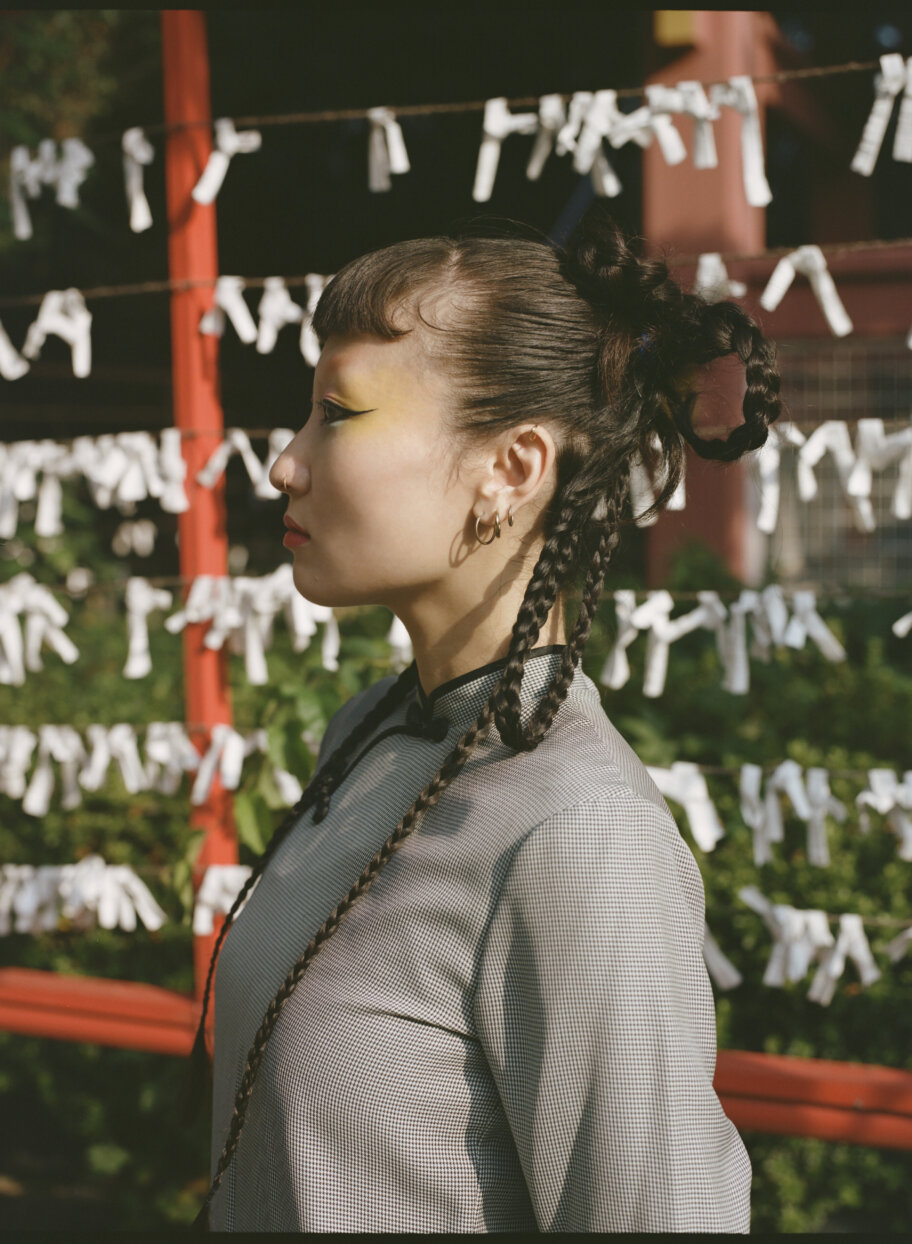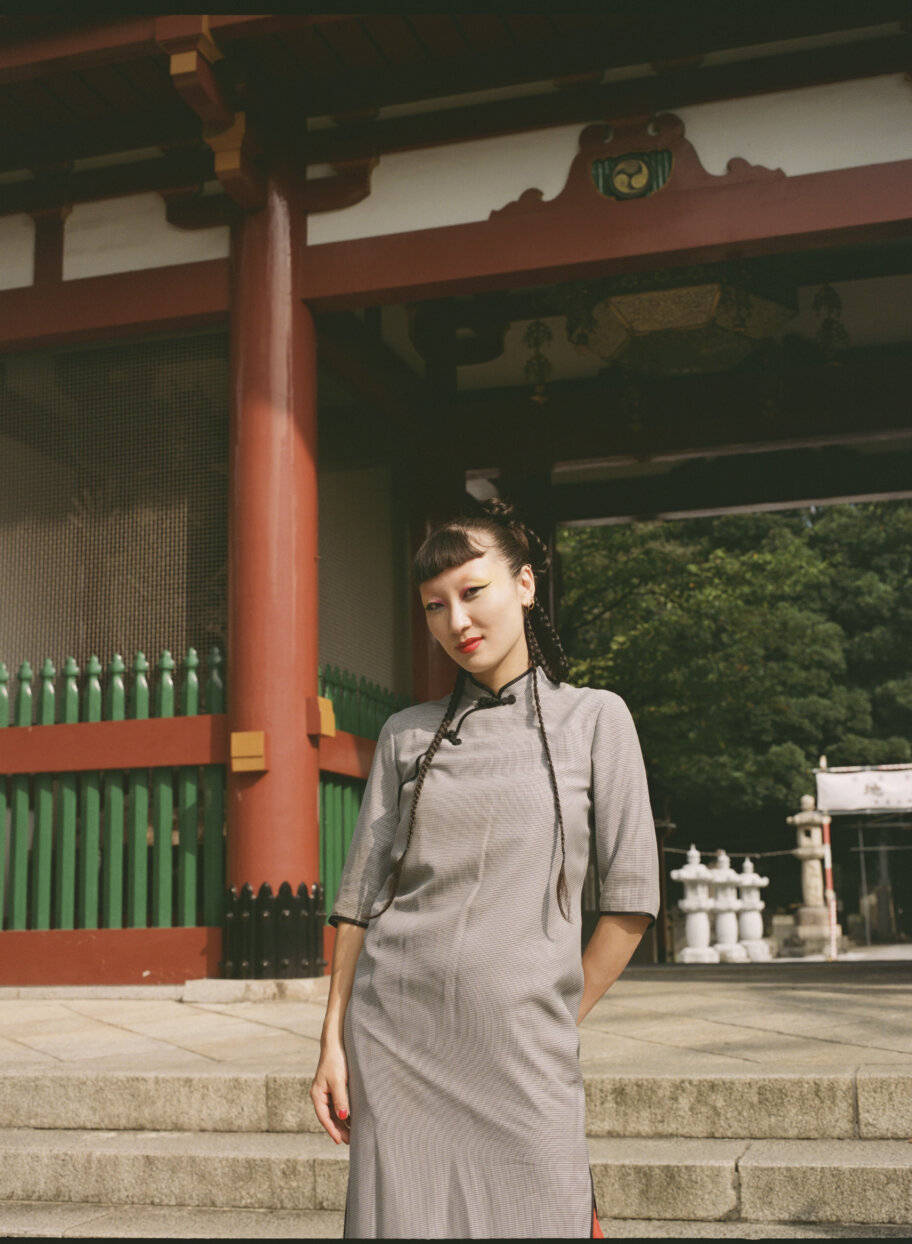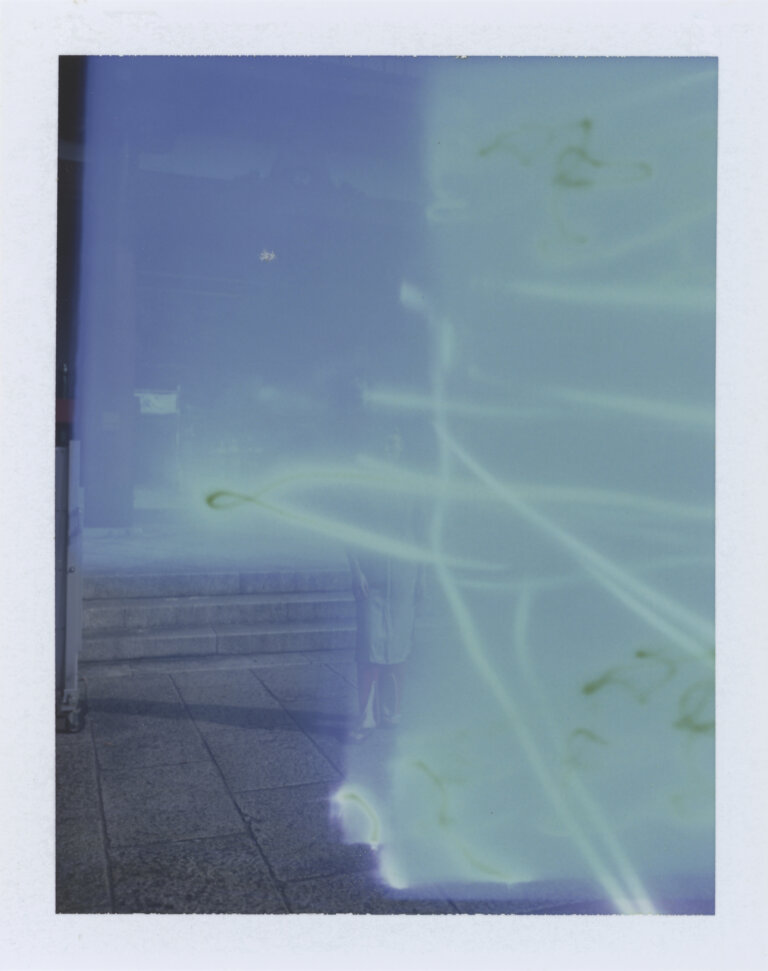
INTERVIEW JESPER GUDBERGSEN @yessirjesper
PHOTOGRAPHER YUJI WATANABE @yuji_w57
You recently left New York and moved back to Tokyo. Can you tell me what inspired the move?
Without going into too many details, the last administration in the US made it difficult to renew visas for some artists, so the root of why I’m here is traumatic. But in a sense, I’m very grateful that I am back here now at this moment.
I have found so many things that I want to do; I needed to be here to experience and see them come to life, including the community fridge. It means a lot to me that I came back at this age, too, with all the experiences I’ve had in New York in my back pocket. I guess I felt I needed to find things to do when I came back, which opened up my eyes to see all the things I was aching to do.
I want to speak to you about beauty, but I’m so curious to hear about the community fridge you helped start in Tokyo. Tell me about it?
In the early stages of the Covid lockdown, when the world was reacting to the death of George Floyd, I was trying to find a way to help. Many immigrants in New York and the US share my experience of not always feeling comfortable participating in riots, protesting, marching, etc. Our foundation for living in the US always seems very fragile and like it can be taken away from us at any time.
One way of contributing for me was by helping my friend Tess, who was cooking for the protesters at City Hall and making Bento boxes for community fridges around New York City. I was basically chopping vegetables and stirring pots in an effort to do what I could to feel part of and support the community.
When I came back to Tokyo, I started hearing stories about people starving. Even people starving to death, because they were afraid to ask for help. You would never think that would happen in a first-world country like Japan. After such a long time, I believe returning helped me look at my home in a new way, almost as a foreigner, which helped open my eyes to just how society works here.
Asking for help is very shameful here; it’s such a taboo. I had a tough time accepting this because we were all going through hard times; the whole world was on fire, and people were dying because they were too embarrassed to ask for food?
I reached out to Fridge Org in the US to gather information on starting a community fridge in Japan. In the beginning, it was very tough; I kept calling the department of health, who did not understand why we would be giving away food; it’s a completely foreign concept.
A while back, there were cases of food poisoning at a large community festival, so people are very apprehensive about free food in general, and even though the news is reporting on people dying of starvation, they couldn’t understand what we were trying to do.
They’re scared. But for me, it isn’t even so much about the giving and receiving of food; it’s even more about having a place for people to go. It’s heartbreaking that someone who has such a strong will and is persistent about staying in Tokyo – a very hard place to live – gets to the point of starving. They’re struggling to put food on the table, and they won’t allow themselves to ask for help.
Beyond food in the fridge, I’m also working to provide women’s health products and other items that are not food-related. People are having a hard time caring for themselves in general and asking for help with that too. Naomi Osaka has had an enormous impact here, showing people that it’s okay to say you are not okay.
I want the fridge to be a part of this larger conversation, speaking about mental health and how you don’t have to be at the very end of your rope to ask for help. I want people to have a place that can be the center of that discussion, a safe space so to speak. At the moment, we cannot be open due to covid restrictions, but I have so many things I want to provide for my community when we can be—one thing at a time.


Do you see a way to include beauty in the community fridge?
I want to take the idea of what the community fridge can be even further and branch into giving people access to free makeup and skincare. I believe that beauty is a form of healthcare; it’s a tool that can help you get ready to face the day.
People say makeup is a luxury, but while I know it’s not a necessity, it is something that really helps people. As we are all going through so much, a little bit of self-care and me-time is so important.
I get judged for caring about appearances, but I think we need to see beyond the surface and understand how it’s really important to take 5 minutes with yourself and see that time in front of the mirror as a meditation, a pep-talk, a grounding moment, whatever you need to make it through the rest of your day.
Since we’re on the topic of beauty, can you tell me a bit about where your love of beauty started?
I grew up dancing and always wore an obscene amount of makeup while being immersed in that world, so I think my foundation came from simply too much makeup! Too much was expected; my teacher loved me with a ton of blue eyeshadow and excessive eyeliner every day. I really was a tomboy, though, and didn’t play around much with makeup outside of that.
Still, my older sister was obsessed with European culture, so I was forced to watch a lot of beautiful movies and read Italian Vogue, which gave my eyes some excellent training. My mom dedicated a lot of time to museums growing up, which I feel is not typical of a traditional Japanese childhood. So when I look back, I did have an excellent ‘education.’
As a teenager, I think this Euro-centric influence kind of backlashed in a way, looking in the mirror started to make me not feel pleased about my looks. At the time, I thought I looked “too Asian” and felt really ugly, but I eventually started playing around a lot with makeup and learned a lot of tips and tricks from my older ballet friends. That gave me a way to play around with my looks and experimenting my way into a place where I felt comfortable.
Although I never felt truly beautiful until I finally accepted myself and how I look – instead of trying to change myself.
Did being from a mixed background – Chinese and Japanese – have something to do with that?
I think so. I almost felt like I looked even more “Asian” than everyone else. I know it sounds crazy because we’re all Asian in Japan, but the beauty ideal at the time was an almost fetishized European-ness – all about how to make your eyes look bigger and not Asian. It was also so focused on being cute and Kawai, which was never really my thing; I’m all about looking cool.
When I went to the US, I suddenly got so many compliments on my eyes that it started to change my mind, and I came to like the way I look. It’s unfortunate, but our perception of our own beauty is so heavily influenced by what other people think of us, especially at a young age, which is why I want to focus so much on that message to young people in Japan. I’m just making a suggestion, but I want to tell them: you do you. You don’t need to look like someone else.
Being a teenager in Europe in the nineties, I feel like we were so influenced by Japanese fashion and beauty, so it’s interesting to hear the story in reverse. I think we almost fetishized Tokyo street style, and I personally always thought there was such freedom of expression?
Even within those scenes in Tokyo, the cliques can be so strict. I think if I had come back at a younger age, I would probably have tried to fit in again too. I am old enough now to have had the experiences abroad that give me the foundation to trust myself and my urge to feel different.
I see it in the young kids here, though; they feel the need to be in a category, they’re afraid to be questioned and be asked why they look different, you know? It’s frustrating to me to walk around Shibuya; I can’t tell anyone apart. Of course, people follow trends worldwide, but in New York, for instance, it feels like people digest and interpret a vibe, as opposed to here, where they copy and paste a look.
Japanese people feel more comfortable when they can ‘figure you out’: people ask me such intimate questions all the time because they can’t read who I am from the way I dress. They can’t categorize me, so they ask about all aspects of my personal life to not fear me.
I think true beauty is unique to each person, so I never liked doing makeup tutorials. I want to speak to the person about what they want to do, learn about their fantasies, and find out how to highlight their uniqueness and express that fantasy. I don’t want to do makeup on someone just because everyone has agreed that this is what we all like right now.
There’s a lot of talk going on about gender and sexual expression in Japan at the moment, too, right?
Yeah, I think Japanese politicians are being really dumb, discriminating against the LGBTQ+ community here. I felt like I could be myself in New York because of my community, who all take pride in being entirely unapologetically themselves. That is not something that is valued here as much.
I think it ties in with what I am trying to do with the community fridge, creating a place that celebrates individuality and can give people that courage. I found that in the fashion and beauty world in New York, so really, what I’m doing with mutual aid here is so close to my life experience being a makeup artist.

What’s the conversation around natural beauty like in Japan at the moment – is there an increased interest in sustainable packaging, responsible sourcing of materials, etc.?
We’ve been talking a lot about SDGs. But, in terms of beauty, I feel like it’s still a very new idea to most people. Carrying a water bottle with me everywhere is confusing to a lot of people even. Japan is all about convenience, and people don’t understand why I would make things harder for myself. The talk still needs to happen here; consumers are so used to be being catered to, and requiring them to be part of the change is a tough ask.
In terms of what I see in the industry, I feel like animal cruelty is taking priority here right now, with major companies changing their brushes to be synthetic and eliminating animal testing. Natural products are a different story, though; It’s still all about K-Beauty and bold colors here. While the American market is seeing more vibrant and fun natural beauty, that category still looks very muted and subtle here.
How are people looking at vintage, recycling, and eliminating plastic in general?
Humans, we’re naturally greedy. Living in a first-world country, we got so used to convenience. If you have money, you can have anything. I think we can change the sentiment here because we had a good culture about this until recently.
I remember growing up seeing fish wrapped in paper at the market, fresh fruit being sold as-is, instead of each piece being individually wrapped. I am not giving up; I am sure we can change it back.
There is pressure in Japan to look clean and proper, so you will never see anyone wearing vintage clothes like in the US. If it’s vintage, you almost can’t tell because it’s so clean and in perfect condition. It is not punk at all.
Circling back to beauty as my last question, where do you find inspiration at the moment?
I am reading a lot right now, and it’s probably a cheesy answer, but I feel connected to nature again. That is what’s inspiring me at the moment. The last few years leading up to Covid, I felt like I was fighting in a ‘real’ world of capitalism and forgot to dream, so now I daydream a lot. It inspires me.
| Cookie | Duration | Description |
|---|---|---|
| cookielawinfo-checkbox-analytics | 11 months | This cookie is set by GDPR Cookie Consent plugin. The cookie is used to store the user consent for the cookies in the category "Analytics". |
| cookielawinfo-checkbox-functional | 11 months | The cookie is set by GDPR cookie consent to record the user consent for the cookies in the category "Functional". |
| cookielawinfo-checkbox-necessary | 11 months | This cookie is set by GDPR Cookie Consent plugin. The cookies is used to store the user consent for the cookies in the category "Necessary". |
| cookielawinfo-checkbox-others | 11 months | This cookie is set by GDPR Cookie Consent plugin. The cookie is used to store the user consent for the cookies in the category "Other. |
| cookielawinfo-checkbox-performance | 11 months | This cookie is set by GDPR Cookie Consent plugin. The cookie is used to store the user consent for the cookies in the category "Performance". |
| viewed_cookie_policy | 11 months | The cookie is set by the GDPR Cookie Consent plugin and is used to store whether or not user has consented to the use of cookies. It does not store any personal data. |